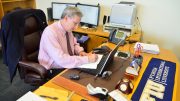Stephanie Feldman/Staff Wrtier
For researchers like Michael Heithaus, plunging into shark-infested waters or wrangling giant sea turtles is just another day at work.
Heithaus, the director of the School of Environment, Arts, and Society is an internationally renowned biologist and ecologist whose work has appeared in scientific journals and has helped produce over a dozen documentaries.
At the Biscayne Bay Campus, Heithaus expresses his commitment to education as a means to make powerful and positive changes in the environment. He hopes that SEAS will help maximize the University’s impact on students and the world through excellence in teaching, research, creative works and partnerships.
“I want to see SEAS [become] a national and international leader in innovative teaching to prepare our students for the challenges that they will face including those that we don’t even know about yet,” Heithaus said.
At the top of Heithaus’ agenda: developing new interdisciplinary undergraduate and graduate programs in the school and collaborating with other colleges and schools. He also stresses the importance of fostering strong partnerships as a way to increase the scope of school’s work and its impact.
For example, National Geographic, where he serves as a research fellow for the Remote Imaging Program and was the host of the “Crittercam” television series from 2002 to 2003, helped conduct research using camera devices that monitor behavior and movement when attached to animals.
Animals have always been an important part of Heithaus’ life.
“I grew up camping and fishing and always loved animals–especially in the oceans–so I knew that I wanted to be a biologist very early in my life,” Heithaus said. ”I also was very curious, so science was a really good fit for me.”
This curiosity has led to a career as a biologist and an established authority on sharks and shark behavior. Heithaus’ research focuses on the importance and influence of large predators on marine ecosystems and their unique relationship with their prey.
His goal is not only to help find solutions to the problems these species face, but to also educate the general public about the vital roles they play in keeping the ecosystem in balance. Learning about these animals involves traveling to the ecosystems most impacted by their presence, such as the Florida Keys and Shark Bay, Australia.
It is in this isolated stretch of sea grass and ocean in Western Australia that the interactions between predator and prey are most evident.
He hopes that his involvement in the Shark Bay Ecosystem Research Project will provide important data about the importance of sea grass ecosystems and how to protect them and other ocean communities.
The project, funded mainly by the National Science Foundation and Natural Sciences and Engineering Research Council of Canada as well as private donors and scientists from around the world, including University students studying the animals that live in this environment and the correlation between their shrinking numbers and the disappearance of sea grass beds.
The material the project gathers is then distributed to a larger audience via its website, SBERP.org, where viewers can see pictures, watch videos and find teaching resources for secondary schools.
SBERP has also collaborated with National Geographic and the Discovery Channel to create educational documentaries as well as inviting middle school science teachers to visit Shark Bay so they can create lesson plans and participate in research.
Heithaus hopes that with his involvement on a local level, creating educational materials for the K-12 audience, as well as many outreach programs, he will not only help find solutions to help struggling species, but “also educate the general public about the role these animals play.”
“Many of the challenges students will face once they graduate will require being able to be creative, to see problems from multiple perspectives, and to work in teams with people from different backgrounds and with diverse perspectives,” Heithaus said. “We want to make sure FIU students are not just prepared, but are ready to be leaders.”






Be the first to comment on "From sea to shining sea, no critter is left unturned"